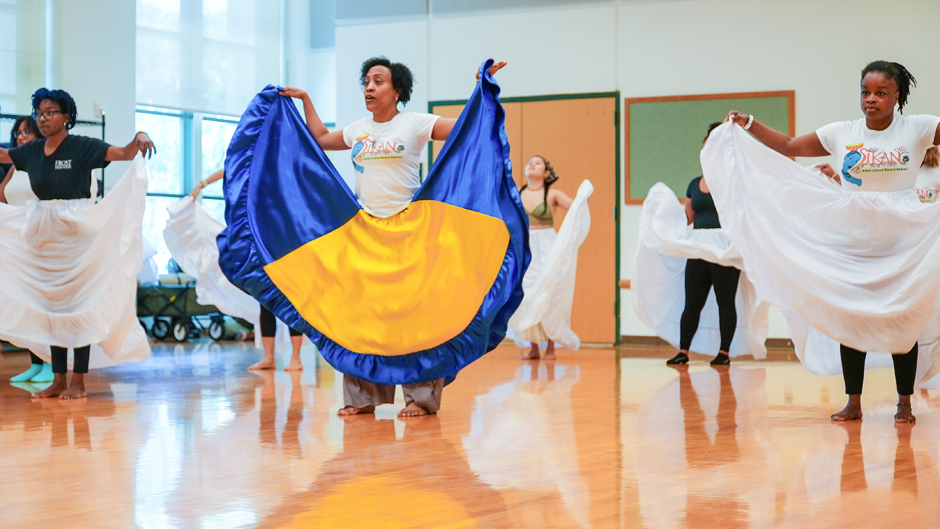African culture is deeply rooted within the history of Cuba and its many traditions. Afro-Cuban folkloric movement—which is derived from the African religion Yoruba—has been used as a form of self-expression for generations.
To honor Hispanic Heritage Month, several departments at the University of Miami, including the Counseling Center, the Office of Multicultural Student Affairs, the Latin Leadership Council, the Black Graduate Students Association, and the Alliance of Latin American Students, along with the Hispanic Heritage Month Committee, joined to host a BIPOC (Black, Indigenous, and People of Color) Radical Healing Circle, featuring an Afro-Cuban folkloric movement class taught by Marisol Blanco, a master teacher.
Blanco, the owner and director of Sikan Afro-Cuban Dance Project, is a Cuban international professional dancer, educator, choreographer, and performer with more than 26 years of experience.
Kisha Bazelais and Catherine Holder, two psychologists within the Counseling Center, decided to host the event to introduce and reconnect the BIPOC campus community to Indigenous forms of healing, which include movement and dance.
“In our programming, we try to be intentional about honoring different BIPOC groups during the month of the year that is dedicated to celebrating their traditions and culture,” said Bazelais, who is Haitian American. “We wanted to celebrate the LatinX community with this event during Hispanic Heritage Month.”
At the start of Thursday’s class, participants stood in a semicircle, barefoot, and with their eyes closed, as a melodic beat played from nearby bombo drums. Adorned in long, flowy white skirts, there was an instant connection between the music and the dancers.
“When you hear the music, who do you relate it to,” Blanco asked the participants.
Emily Bosworth experienced the class and declared that it was unlike any other she had taken before.
“I’ve never taken an Afro-Cuban folkloric dance class before and I felt connected to the other group members and felt connected to nature,” said Bosworth, a third-year student in the counseling psychology doctoral program.
Rachel Northrop, a fourth-year Ph.D. student in English, has been a member of Blanco’s dance company since 2019 when she moved to Miami. She participated in the class to support Blanco and to honor Hispanic Heritage Month.
“When I came to Miami from New York, I was in search of Afro-Brazilian courses because that’s what I was taking back home. Instead, I found Blanco’s studio. And it has been the highlight of my time here in Miami,” said Northrop. “Blanco is truly a master. She has trained my ear and is super knowledgeable.”
In addition to teaching the dance moves for more than an hour, Blanco also provided the history of the dance moves as well.
“In every dance move there was a connection to healing and land-based elements,” said Bazelais. “I left the experience feeling very connected to the Afro-Cuban culture as well as to myself as a member of the Afro-Caribbean community.”
BIPOC Radical Healing Circles are held on a monthly basis. Contact the Counseling Center to learn more about their future events.

